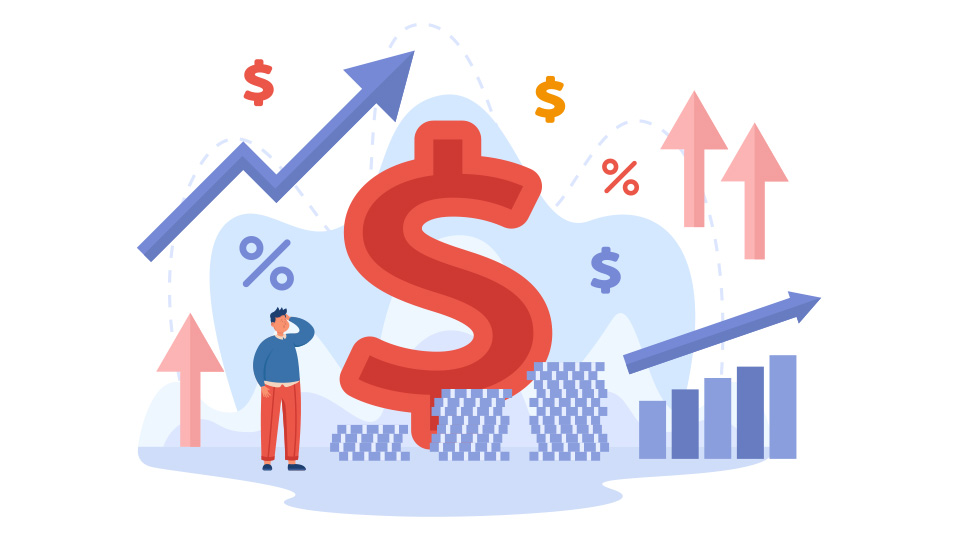Why financial advisers are invaluable during the pandemic
Research has found that the help of a financial adviser can be invaluable during unstable times like the pandemic. Here’s why.
May 13, 2022

Inflationary pressures have been increasing in Australia and other parts of the world for a while now.
Initially, this started as demand shifted from services to goods while much of the world was in lockdown and supply chains were negatively impacted, thereby leading to price increases.
There was no initial panic as it was expected that this would be transitory and once lockdowns ended, demand would then shift back to services and supply chain bottlenecks would ease.
Fast forward and that hasn’t transpired and, as such, inflation has become more entrenched and somewhat run away from central banks, who are now tightening policy to put the brakes on inflation.
The Reserve Bank of Australia (RBA) has raised rates by 0.25 per cent, signalling the first round of monetary policy tightening in over a decade. Further increases in rates are expected in the coming months as the RBA also looks to keep inflation within acceptable parameters.
Rising interest rates usually means slower and more volatile returns for shareholders. It doesn’t necessarily mean a bear market, and historically the market usually dips upon the first interest rate rise but then resumes it’s uptrend until rates become onerously tight.
The unknown at this time is rampant inflation in other parts of the world such as the US, where the central banks are having to tighten more quickly, which represents a risk to further economic growth.
Add to this the ongoing conflict in the Ukraine and economic impact of sanctions on Russia, combined with the pandemic and property issues in China, and it’s an uncertain outlook.
So far, the Australian share market is holding up well when compared to the US, where the overall market is down a lot more from the peak and the Nasdaq index is moving into bear territory.
The removal of monetary policy stimulus and increasing interest rates shouldn’t be thought of as a negative, as it is a sign of improving economic conditions and stronger profits. While interest rates are rising, they are coming off a historically low base, so monetary and fiscal policy still remain accommodative.
The concern, particularly overseas, is that if the increased interest rate isn’t met with stronger growth, we then risk a stagflation environment – high inflation with a shrinking economy.
We would also expect rising rates to have a negative impact on house prices given the very high level of household debt in Australia. Many households in Australia have never seen a rise in their mortgage interest rate, and just how much capacity they have in their household budgets to manage this increase is unknown.
Add to this the $300+ billion in fixed rate loans set to expire in the next 12-24 months and that is a lot of potential increases in mortgage payments across the country.
While inflation is much higher than central banks have anticipated, and this will lead to rates rising faster than expected, it is also worth noting that high levels of debt will mean increased sensitivity to interest rate rises.
In Australia, the high level of household debt means that increases in mortgage interest rates will potentially lead to less consumer spending, as mortgage payments consume more household income, and this then leads to lower growth and offsets the need to raise rates further.
For the RBA, as with all other central banks, it will be a careful balancing act to keep inflation down without crushing economic growth at the same time.
Investors can still find opportunities to profit in the current environment but it will require more careful analysis, investment selection, and management as the situation unfolds. Investing in quality companies with low gearing and reliable earnings will be important.
One positive thing that will come out of rising interest rates is that the return on the defensive parts of an investor’s portfolio should increase.
Your average ‘balanced’ investor typically has 30-40 per cent of their portfolio in defensive assets and the income yield on these has been at historically low levels for some time.
As interest rates rise, the opportunity to earn more income from fixed interest investments will also improve.
LDB’s wealth management experts and financial planners have proved invaluable during the pandemic, and as we navigate further uncertain times, you may need help with managing your investment portfolio.
We can assist with strategic financial advice on everything including superannuation, investing in the share market, estate planning, retirement planning, personal insurance advice, and more.
To get in touch, call (03) 9875 2900 or send us details via the contact form below.
Research has found that the help of a financial adviser can be invaluable during unstable times like the pandemic. Here’s why.

Our team is taking a short break, with the office closed from 4pm Thursday 19th December 2024, reopening on Monday 6th January 2025. The Property department will be available for urgent matters and will operate in a limited capacity between 2nd and 5th January.
